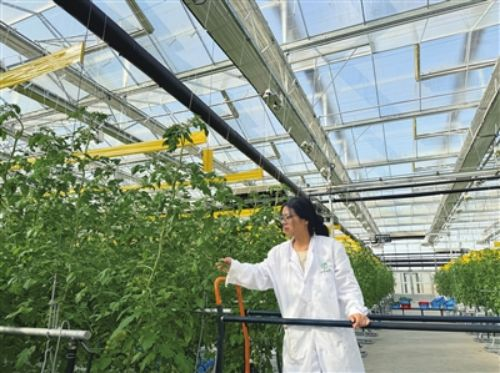Smart Agriculture Empowers Tomato Farming
2024-01-03 11:00

With the exception of planting and harvesting, every other step is automated through machinery. The result is year-round production, and this is happening in the Guangming Ruihua Tomato Industrial Park in Chongming, Shanghai - a place where technology meets tomatoes.
In early winter, as the cold sets in, entering the glass greenhouse of the Guangming Ruihua Tomato Industrial Park brings a wave of warmth. Along the long rows of cultivation troughs spanning hundreds of meters, layers of vibrant green vines climb upwards along guiding wires, full of life and vitality. Beneath the vines, clusters of round, plump tomatoes are ripening. "These are cluster tomatoes, and the growth cycle of the plants can reach around 300 days, allowing for year-round production," explained Sun Yu, a production technician at the Guangming Ruihua Tomato Industrial Park. "Unlike traditional tomato cultivation, all the tomatoes in the glass greenhouse are grown using soilless cultivation techniques and irrigated with collected rainwater. This not only saves labor costs but also ensures better tomato growth."
Internet of Things (IoT) systems are also widely applied in the glass greenhouses of the industrial park, enabling intelligent monitoring and precise management of the greenhouse environment, effectively enhancing agricultural production efficiency and quality. The top windows of the glass greenhouse can open and close automatically based on indoor temperature and humidity. Inter-row heating pipes and ground heating pipes regulate the temperature to create an optimal environment for crop growth. Additionally, environmental sensors distributed throughout the greenhouse collect real-time data on temperature, humidity, and light levels, uploading this information to the IoT system in the control room. The system, guided by algorithm models, provides recommendations on when to adjust lighting and when to water and fertilize.
But why do they only cultivate tomatoes in the glass greenhouse? Workers explained that exclusively growing tomatoes not only allows growers to accumulate experience and improve their skills in cultivation methods but also stabilizes and enhances tomato production and quality. Simultaneously, it promotes the development and utilization of high-tech agricultural facilities and equipment.
On-site, we observed a testing phase for the "Smart Agriculture Robots" project led by Fudan University's research team. "Our smart agriculture robots can accurately detect and locate tiny tomato flowers within the foliage, and then, in conjunction with a robotic arm, achieve autonomous pollination of tomato flowers," said the project leader. "In the future, these robots can be used at various stages of tomato cultivation and harvesting inside the glass greenhouse. These automated robots will drive the overall development of agricultural industrialization, reduce labor costs and agricultural labor hours, and improve work efficiency."